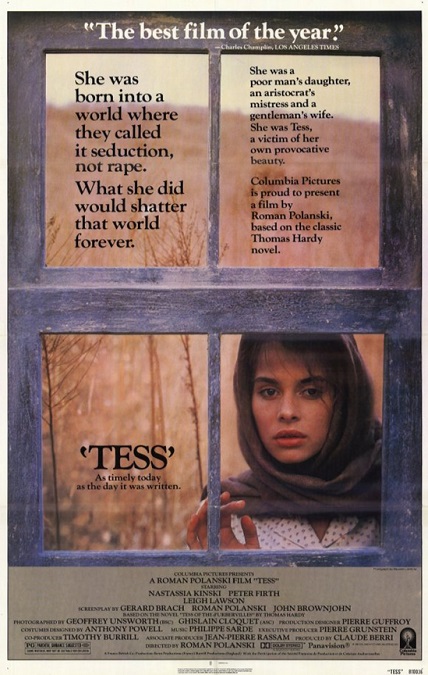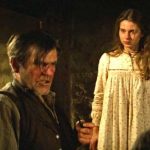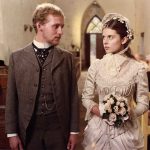
Tess – 1980
Tess was not a bad movie, but it would have been so much better if it weren’t for its lead actress. I’m not saying that Nastassja Kinski couldn’t act. I’m just saying that she was wrong for the part. Why? Because she was not British. She was a German-born actress who, though she tried to deliver her dialogue with an English accent, couldn’t do it. Everyone else in the cast was either British or had a believable accent. She didn’t, and it stood out like a sore thumb to me.
But if you can get past that, I suppose she did just fine. Not great, but fine… usually. Well, I mean… there were times when her acting consisted of looking pouty and posing for the camera. But there wasn’t too much of that. She was very pretty, something that was essential for the character. And in certain scenes, the character of Tess was actually sullen and pouty.
Tess was a film that followed the life of a poor country girl who, as it turns out, is the latest descendent of an aristocratic, but long destitute family, the d’Urbervilles. When her poor and unscrupulous parents send her to the wealthy house of the modern day d’Urbervilles in hopes of getting money from them, Tess reluctantly goes. She is hired on as a servant by the sleazy Alec d’Urberville, played by Leigh Lawson, though we soon find out that he really belongs to the Stokes family who bought the d’Urberville lands and name.
I call Alec sleazy because upon meeting her, he immediately tries to seduce her. He eventually rapes her and gets her pregnant. She runs back to her poor family and has the baby which dies in infancy. She gets work as a milk maid on a dairy farm. There, she meets a handsome young man who truly falls in love with her. He is Angel Clare, played by Peter Firth, and the two eventually marry.
Unfortunately, after the wedding vows are taken, Tess tells him of her past and he rejects her, leaving her to travel abroad. Meanwhile, Alec has learned of her whereabouts and still wants her, though he clearly does not love her. As an evil aristocrat, he wants her as a beautiful possession. Eventually Tess accepts his advances to escape her poverty.
Angel finally realizes that he still loves her and tries to get her back. She tells him it is too late and sends him away. But before he can get too far, she murders Alec and runs away with him. Now faced with an impending murder charge, Tess and Angel go on the run. But after spending the night in Stonehenge, Tess is caught. Some epilogue text tells us that the young woman is convicted of murder and hanged.
The actors in the film that really stood out to me were Peter Firth and one of Tess’s closes friends among the poor farming stock, Marian, played by Carolyn Pickles. I especially liked Firth in the final scenes when he returns to beg Tess’s forgiveness for abandoning her. When she tries to send him away, the wretched and dismal on his poor face was very well portrayed. I liked his character and felt really bad for him. I agreed with her decision to turn him down, especially after the way he had treated her. Then, when he tries to help her escape the law, I liked him even more. I also liked the actress who played Tess’s mother, Mrs. Durbeyfield, played by Marion Martin.
And lest I forget, the cinematography was very striking. The depiction of 18th century English peasants was very realistic. I’m not a farmer, but I imagine that it is a hard life, and all the peasants were shown to live in extremely meager conditions, full of mud, sweat, and back-breaking physical labor. And fortunately, Tess’s beauty did not make her exempt from these hard facts of peasant life. Even more than that, there were some beautiful outdoor shots of the English countryside that were breathtaking.
The music, composed by Phillippe Sarde, was wonderfully lush and emotional, really helping to play up the romantic scenes between Tess and Angel. In fact, Tess was nominated for six Academy Awards. Aside from Best Picture, Tess was also nominated for Best Cinematography, a Best Director nod for Roman Polanski, Best Original Score, Best Art Direction, and Best Costume Design, the last three making up its wins.









“TESS ” AND ” BARRY LYNDON ” ARE TWO OF MY ALL TIME FAVORITE FILMS . TO ME , BOTH ARE MASTERPIECES.